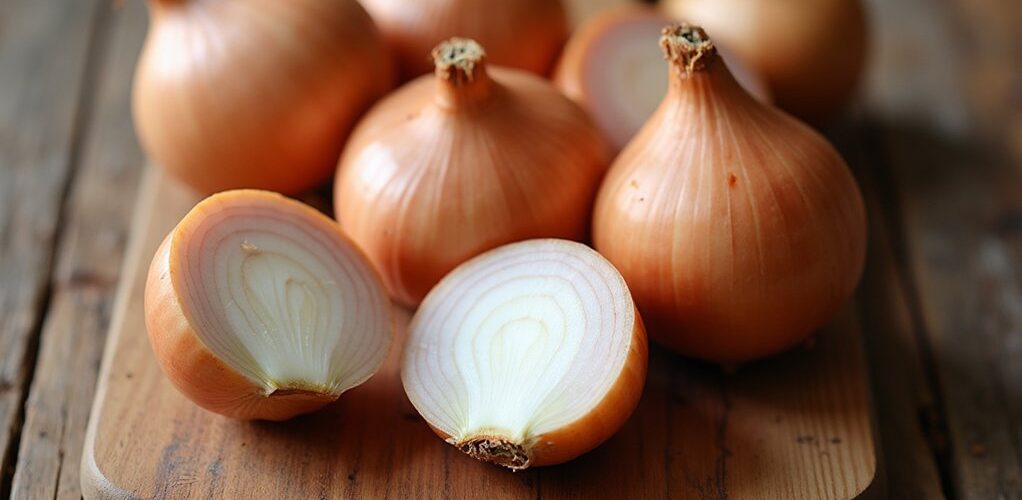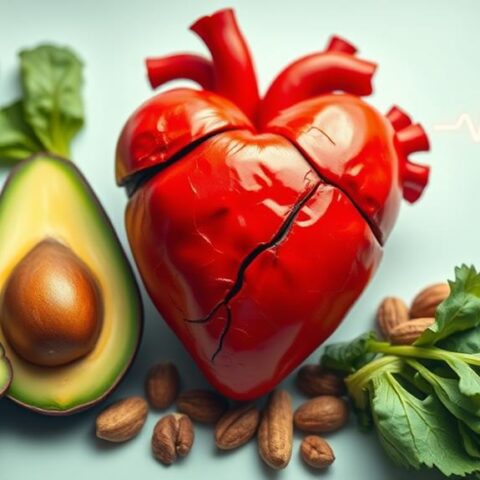
Onions contain moderate carbohydrate levels, with yellow onions providing 7.64g net carbs per 100g, while red and white varieties contain slightly more at around 8.2g. Green onions offer a lower-carb alternative at 2.3g per cup, making them more suitable for ketogenic diets. While onions deliver valuable nutrients like vitamin C, antioxidants, and prebiotic fiber, portion control remains essential for maintaining ketosis. Strategic measurement and cooking techniques can help maximize onion's flavor while minimizing carb impact.
Key Takeaways
- Onions are moderate to high in carbs, with yellow onions containing 7.64g net carbs per 100g, making them challenging for strict keto diets.
- Green onions are the most keto-friendly option, containing only 1.2g net carbs per half-cup serving.
- Portion control is essential when using onions on low-carb diets, with recommended servings of 20-30g for regular onions.
- Onion powder and small amounts of caramelized onions can provide flavor while keeping carb intake minimal.
- Despite their carb content, onions offer valuable nutrients and antioxidants, making them worth including in moderation on low-carb diets.
The Truth About Onions and Their Carb Content
Many people following low-carb diets are surprised to learn that onions, despite their versatile culinary uses, contain a moderate amount of carbohydrates that requires careful consideration. The carbohydrate content varies among different onion varieties, with yellow onions containing 7.64 grams of net carbs per 100 grams, while red onions slightly exceed this at 8.21 grams. Green onions offer a lower-carb alternative, providing only 2.3 grams per cup. For those strictly monitoring their carbohydrate intake, particularly on ketogenic diets with a typical 20-gram daily limit, portion control becomes essential. While onions shouldn't be eliminated entirely due to their flavor-enhancing properties and nutritional benefits, mindful consumption through measured portions and strategic cooking methods like sautéing can help maintain carb restrictions while still enjoying their culinary advantages. It's important to note that starchy vegetables should be avoided on a keto diet due to their high carbohydrate content, making onions a more viable option when consumed in moderation.
Understanding Different Types of Onions
Different varieties of onions present distinct carbohydrate profiles, making some more suitable than others for low-carb dietary choices.
Among common onion varieties, green onions emerge as the most low-carb friendly option, containing just 2.3 grams of net carbs per 100 grams.
Yellow onions contain 7.64 grams of net carbs per 100 grams, while white onions follow closely with 8.20 grams.
Red onions rank highest in carbohydrate content at 8.21 grams per 100 grams and feature significantly higher sugar levels compared to other varieties.
This variation in carbohydrate content suggests that those following strict low-carb diets might want to prioritize green onions in their meal planning, while using other onion types more sparingly to maintain their dietary goals effectively.
Health Benefits Beyond the Carb Count
The impressive health profile of onions extends far beyond their carb content, with potent antioxidants like quercetin working to strengthen immune function and reduce inflammation throughout the body. These versatile vegetables serve as natural immune boosters, providing essential nutrients such as Vitamin C, B6, and folate that support overall wellness. Additionally, onions contain prebiotic fiber that acts as nourishment for beneficial gut bacteria, helping to maintain a healthy digestive system and strengthen the body's natural defenses. Furthermore, the ketogenic diet is known to significantly reduce blood glucose levels, which can complement the health benefits of onions by supporting stable blood sugar levels and enhancing insulin sensitivity.
Antioxidant-Rich Immune Booster
While onions are often scrutinized for their carbohydrate content, these pungent vegetables offer an impressive array of immune-boosting compounds that extend far beyond their macronutrient profile.
The antioxidant-rich properties of onions, particularly their high quercetin content, play a vital role in reducing inflammation and strengthening immune function, while supporting heart health through improved cholesterol management and blood pressure regulation.
- Contains essential nutrients like Vitamin C, B6, folate, and potassium for ideal immune response
- Features quercetin, a powerful antioxidant that fights inflammation and protects cells
- Provides prebiotic fibers that support beneficial gut bacteria and digestive health
- Helps reduce the risk of chronic diseases through its extensive nutrient profile and antioxidant properties
Gut Flora's Best Friend
Beyond their impressive immune-boosting properties, onions serve as powerful allies for digestive health through their remarkable effects on gut flora. Their high prebiotic fiber content specifically nourishes beneficial bacteria in the digestive system, fostering a balanced and thriving microbiome.
The combination of soluble fiber and antioxidants, particularly quercetin, works synergistically to reduce inflammation and enhance digestive function. These compounds support regular bowel movements and help prevent constipation, while simultaneously promoting the growth of beneficial probiotics in the gut.
At just 40 calories per 100 grams, onions offer these digestive benefits without considerably impacting daily caloric intake, making them an excellent addition to any balanced diet focused on maintaining ideal gut health.
Smart Ways to Include Onions in Keto Meals
Making smart choices about onion portions and preparation methods allows keto dieters to enjoy this flavorful vegetable without exceeding their daily carb limits.
Strategic incorporation of onions into keto-friendly meals can enhance flavor while maintaining low-carb goals. Green onions offer a particularly excellent option due to their markedly lower carb content, making them ideal for garnishing and flavoring dishes.
- Use caramelized onions as a concentrated flavor boost, requiring smaller portions for maximum impact
- Combine onions with low-carb vegetables like mushrooms to create balanced, satisfying dishes
- Opt for green onions when possible, as they contain fewer carbs than regular onions
- Incorporate small amounts of diced onions in soups and stir-fries for flavor without carb overload
For those following a keto diet, non-starchy vegetables like broccoli, cauliflower, and spinach are highly recommended, as they help maintain ketosis while providing essential nutrients.
Green Onions: Your Low-Carb Alternative
Green onions emerge as a standout solution for low-carb dieters seeking the distinctive flavor of onions without the higher carb content. With just 2.3 grams of net carbs per 100 grams, they offer a significant reduction compared to traditional onions while maintaining versatility in cooking applications. When following a ketogenic diet, it is crucial to differentiate between total and net carbohydrates to ensure that you stay within your daily carb limits. Their mild flavor profile makes green onions an excellent low-carb choice for various dishes. A half-cup serving contains only 1.2 grams of net carbs, allowing for liberal use in recipes while maintaining ketogenic diet requirements. Whether used raw as a garnish or incorporated into cooked dishes, green onions provide the perfect balance of flavor and carb consciousness.
| Comparison | Net Carbs/100g | Best Uses |
|---|---|---|
| Green Onions | 2.3g | Garnish, Salads |
| Yellow Onions | 7.0g | Cooking, Sautéing |
| Red Onions | 7.1g | Raw, Pickling |
Portion Control Strategies for Onion Lovers
Successful onion management on a low-carb diet requires careful measurement and precise portioning techniques, with even small amounts adding significant flavor to dishes.
Measuring onions by the tablespoon rather than eyeballing portions helps maintain strict carb limits while still enjoying their taste, particularly when incorporating them into larger recipes.
Armed with a kitchen scale and measuring spoons, onion lovers can track their intake accurately, ensuring they stay within their daily carb allowances while maximizing the flavor impact of this versatile ingredient.
Measuring For Keto Success
Precise portion control stands as the cornerstone of successfully incorporating onions into a ketogenic diet, particularly since these flavorful vegetables can quickly consume a considerable portion of daily carb allowances.
Understanding proper measurement techniques guarantees keto-friendly meal preparation while maximizing flavor impact. A medium onion contains approximately 7.64 grams of net carbs per 100 grams, making careful portioning essential for maintaining ketosis.
- Use a kitchen scale to measure onion portions accurately, aiming for small amounts around 20-30 grams
- Opt for green onions when possible, as they contain much fewer carbs at 2.3 grams per cup
- Pre-portion and store onions in small containers or bags to prevent overuse during cooking
- Consider using dried onion powder or flakes for controlled flavoring, measuring by the quarter teaspoon
Smart Onion Cooking Tips
Following proper measurement techniques, onion enthusiasts can employ several smart cooking strategies to maximize flavor while adhering to low-carb dietary requirements. Caramelizing onions concentrates their natural sweetness, allowing cooks to use smaller amounts while maintaining robust flavor profiles. When managing carb content, combining onions with low-carb vegetables creates satisfying dishes without exceeding dietary limits.
| Cooking Method | Portion Size | Net Carbs |
|---|---|---|
| Raw Chopped | 1 tbsp | 1.6g |
| Green Onions | 1/2 cup | 1.2g |
| Caramelized | 2 tbsp | 3.2g |
| Sautéed | 1/4 cup | 4.2g |
For ideal results, use green onions as a lower-carb alternative, or incorporate small amounts of finely chopped regular onions as a flavoring agent rather than a main ingredient.
Cooking Methods to Maximize Onion Flavor
While onions naturally contain carbohydrates, specific cooking techniques can amplify their flavor contribution to low-carb dishes without requiring larger portions.
Various cooking methods can enhance onions' natural sweetness and depth while managing their carbohydrate content effectively.
- Caramelizing onions through slow cooking develops rich, complex flavors without adding extra carbs.
- Sautéing in healthy fats like olive oil or coconut oil creates a flavorful base while maintaining keto compatibility.
- Grilling or roasting concentrates natural sweetness, making smaller portions more impactful.
- Combining finely chopped onions with garlic creates an aromatic foundation that requires less quantity overall.
These preparation techniques allow for maximum flavor extraction while keeping carbohydrate content in check, making onions a versatile ingredient in low-carb cooking.
The key lies in choosing methods that intensify taste without increasing portion sizes.
Batch cooking allows one protein to transform into multiple dishes throughout the week, similarly enhancing the versatility of onions in low-carb meal prep.
Comparing Onions to Other Vegetables
When examining carbohydrate content across vegetables, onions rank significantly higher at 7.64g net carbs per 100g compared to alternatives like mushrooms at 1.0g or zucchini at 2.0g per half-cup serving. Health-conscious consumers can consider swapping regular onions with green onions, which contain only 2.3g of carbs per cup, or other low-carb vegetables like cauliflower and kale, both offering around 2.0g net carbs per serving. These comparisons provide valuable guidance for those following ketogenic or low-carb diets who need to carefully monitor their carbohydrate intake while maintaining flavor in their meals. The Keto diet's unique macronutrient composition requires strict adherence to low carbohydrate intake to maintain ketosis, making it essential to choose vegetables with lower carb content.
Carb Content Comparison Chart
A detailed comparison of carbohydrate content reveals considerable differences between onions and other common vegetables.
Regular onions contain 7.64 grams of net carbs per 100 grams, while red onions have a slightly higher content at 8.21 grams.
However, several alternatives offer considerably lower carbohydrate profiles for those following a low-carb or ketogenic diet.
- Green onions provide a more carb-conscious option with only 2.3 grams of net carbs per 100 grams
- Mushrooms stand out as particularly keto-friendly with just 1.0 gram of net carbs per 1/2 cup
- Zucchini maintains a moderate carb profile at 2.0 grams per 100 grams
The difference between regular and red onions is approximately 0.57 grams per 100 grams.
Smart Vegetable Swap Options
Several vegetable alternatives offer considerably lower carbohydrate content than regular onions, making them excellent substitutes for health-conscious individuals following low-carb or ketogenic diets. Among these keto-friendly foods, mushrooms stand out with just 1.0 gram of net carbs per half-cup serving, while zucchini and cauliflower provide smart alternatives at 2.0 and 1.5 grams respectively.
| Vegetable | Net Carbs (per serving) | Serving Size |
|---|---|---|
| Onions | 7.64g | 100g |
| Mushrooms | 1.0g | 1/2 cup |
| Zucchini | 2.0g | 1/2 cup |
| Cauliflower | 1.5g | 1/2 cup |
| Green Onions | 2.3g | 1 cup |
Green onions emerge as a particularly versatile replacement, delivering similar flavoring potential with markedly fewer carbohydrates than regular onions.
Nutrient Profile and Gut Health Benefits
Onions pack a powerful nutritional punch while offering significant benefits for digestive health. Their nutrient profile features essential vitamins and minerals, including Vitamin C, B6, and folate, alongside potent antioxidants like quercetin.
The prebiotic fiber content supports gut health by nourishing beneficial bacteria in the digestive system, contributing to overall wellness and improved digestion.
- Contains quercetin, a potent antioxidant that helps reduce inflammation and may lower cancer risk
- Provides prebiotic fiber that serves as food for beneficial gut bacteria
- Rich in essential vitamins C, B6, and folate, supporting immune function and cellular health
- Delivers potassium, an important mineral for heart health and blood pressure regulation
Balancing Onions in Your Daily Carb Allowance
Successfully incorporating onions into a low-carb eating plan requires careful consideration of portion sizes and daily carbohydrate limits. With approximately 7.64 grams of net carbs per 100 grams, onions can quickly consume a significant portion of the typical 20-gram daily carb allowance for keto dieters. Balancing onions in your daily carb allowance becomes more manageable by treating them as a flavoring agent rather than a main ingredient. Green onions offer a practical alternative, containing only 1.2 grams of net carbs per half-cup serving. To maintain ketosis while enjoying onions, combine them with other low-carb vegetables and carefully measure portions. This strategic approach allows individuals to experience the flavor enhancement that onions provide while staying within their carbohydrate restrictions. It's important to monitor macronutrient intake closely to ensure you remain within the keto diet's carb limits while enjoying onions and other vegetables.
Tasty Low-Carb Substitutes for Onions
While embracing a low-carb lifestyle requires careful planning, numerous flavorful alternatives can effectively replace traditional onions in recipes. Several low-carb substitutes offer similar textures and flavors while keeping carbohydrate content minimal. Green onions lead the pack with just 2.3g net carbs per 100g, while mushrooms provide umami depth at only 1.0g per half cup. For those seeking versatility, both cauliflower and zucchini offer excellent alternatives at 1.5g and 2.0g net carbs per half cup, respectively.
Finding low-carb alternatives doesn't mean sacrificing flavor – smart substitutions maintain taste while helping you stick to dietary goals.
- Green onions can be used raw or cooked, making them perfect for garnishes and cooking.
- Mushrooms provide a satisfying meaty texture and deep flavor profile.
- Finely chopped cauliflower works well in both cooked dishes and cold salads.
- Bell peppers add sweetness and crunch while maintaining relatively low carb counts.
Incorporating leafy greens into meals not only enhances flavor but also adds essential nutrients and keeps carb counts low.
Frequently Asked Questions
Are Onions Ok on a Low Carb Diet?
Different onion varieties can fit into a low carb diet when portions are carefully controlled. Green onions offer fewer carbs than yellow onions, making them a better choice for strict carb limits.
Will Onions Knock You Out of Ketosis?
Different onion varieties can fit into ketosis when portions are carefully controlled. Regular onions require strict monitoring, while green onions offer a lower-carb alternative that's less likely to disrupt ketosis.
Do Onions Have a Lot of Carbohydrates?
Different onion varieties contain moderate to significant carbohydrates, with yellow onions having 7.64g, red onions 8.21g, and white onions 8.20g per 100g. Green onions offer a lower-carb alternative.
Can You Eat Onions and Peppers on Keto?
Both onions and peppers can be consumed on keto when portioned carefully. These keto vegetables should be limited, with green onions being a better choice than regular onions for lower carb counts.
Conclusion
While onions contain carbohydrates, they can fit into a low-carb lifestyle when used mindfully. Their rich nutrient profile, intense flavor, and health benefits make them worth incorporating in moderation. By choosing varieties like green onions, using smaller portions, or opting for low-carb alternatives, health-conscious individuals can enjoy onions' distinctive taste without compromising their dietary goals. Smart portion control allows for the best of both worlds.










No Comments